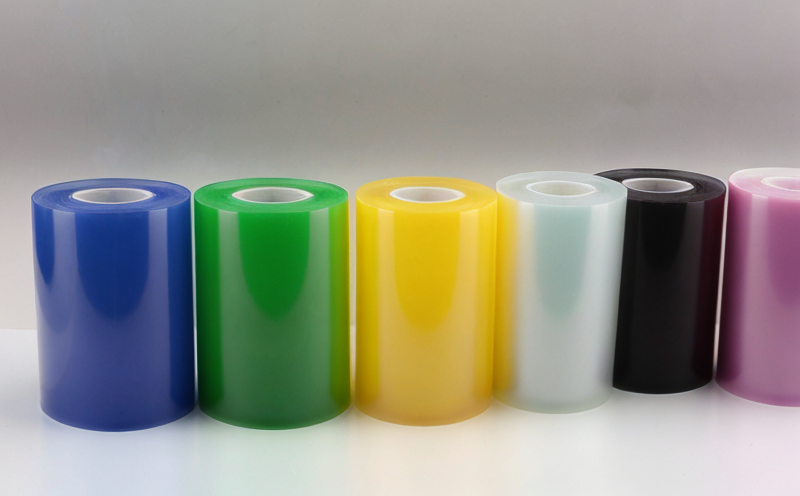ASTM D2240 Hardness Testing of Plastic Films
The ASTM D2240 hardness test is a fundamental procedure used to determine the resistance of plastic films and sheets to indentation. This test measures the hardness by applying a standard force through a spherical indenter onto the surface of the material, which yields an indentation. The depth of this indentation is then measured using a micrometer or laser sensor, providing a quantitative measure of the film's hardness.
This testing method is particularly useful for evaluating the durability and performance of plastic films in various applications. For instance, it helps quality managers ensure that their products meet regulatory standards and customer expectations. Compliance officers rely on this test to verify adherence to industry norms such as ISO 14972 or ASTM D3680. R&D engineers use ASTM D2240 hardness testing to innovate and refine materials for new applications, while procurement teams leverage the results to select suppliers who provide consistent quality.
The test is widely used in sectors like packaging, automotive, and electronics where material integrity is critical. In these industries, plastic films are subjected to physical stressors such as bending, stretching, or exposure to environmental factors that can impact their hardness. By conducting ASTM D2240 testing, manufacturers can ensure that the films maintain adequate hardness throughout their lifecycle.
The process involves carefully selecting and preparing a representative sample of the plastic film according to specified dimensions in ASTM D2240. This ensures that the test results are accurate and reliable. The indenter is then applied to the center of the film, and the depth of the indentation is measured using precise instrumentation. The hardness value is calculated based on this measurement.
- Sample Preparation: Ensures uniformity in testing by following strict dimensions outlined in ASTM D2240.
- Indenter Application: Uses a standard tungsten carbide ball to create an indentation on the film's surface.
- Depth Measurement: Utilizes high-precision micrometers or laser sensors for accurate depth readings.
Scope and Methodology
The ASTM D2240 test is designed to assess the hardness of plastic films by measuring the resistance to indentation. The procedure involves applying a specified force through an indenter onto the film's surface, recording the resulting indentation depth, and calculating the hardness value based on this measurement.
For this method, the test specimen should be a square or circular piece of the film with defined dimensions as per ASTM D2240. The indenter is typically a tungsten carbide ball that conforms to specific geometrical requirements. Once properly positioned at the center of the sample, the force is applied gradually until an indentation of predetermined depth is achieved.
The test results are reported in terms of hardness units defined by ASTM D2240. The methodology also includes considerations for temperature control and environmental factors that could influence the test outcome. This ensures consistency across different testing environments and laboratories.
ASTM D2240 is applicable to a wide range of plastic films, including polyethylene (PE), polypropylene (PP), polystyrene (PS), and others. The choice of material type can influence the test parameters, such as the indenter size and applied force.
Eurolab Advantages
At Eurolab, we specialize in providing comprehensive testing services that meet or exceed international standards. Our expertise in ASTM D2240 hardness testing of plastic films ensures accurate and reliable results. With state-of-the-art equipment and experienced technicians, our laboratory can provide detailed insights into the mechanical properties of your materials.
We offer a range of additional services tailored to your specific needs, including custom sample preparation, advanced data analysis, and comprehensive reporting. Our commitment to quality is reflected in our ISO 17025 accreditation, which guarantees that all tests are conducted in accordance with the highest industry standards.
Our team of experts can help you interpret test results and provide recommendations for improving material performance. Whether you're looking to ensure compliance with regulatory requirements or enhance product quality, Eurolab is your partner in achieving these goals.
Competitive Advantage and Market Impact
- Accurate Testing: Ensures that you are meeting the exacting standards required by industry regulations and customer expectations.
- Detailed Insights: Provides deep insights into your materials' mechanical properties, helping to identify areas for improvement.
- Compliance Assurance: Helps maintain regulatory compliance through consistent testing practices.
- Innovation Support: Assists in the development of new and improved products by identifying material characteristics that contribute to superior performance.
By leveraging ASTM D2240 hardness testing, you can gain a competitive edge by ensuring high-quality materials that meet or exceed customer demands. This not only enhances product reputation but also contributes positively to the overall market impact of your business.





